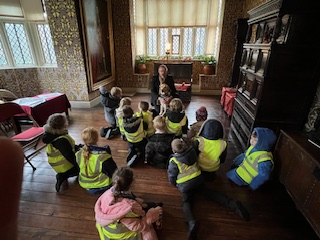A people without the knowledge of their past history, origin and culture is like a tree without roots.’ - Marcus Mosiah Garvey
At St Peter’s Catholic Primary school we want our children to understand their place in the world and in the story of human development. History lessons, help our pupils gain a coherent knowledge and understanding of Britain’s past and that of the wider world. We aim to harness the children’s curiosity to know more about the past and for children to ask questions, think critically, analyse evidence and develop perspective.
History
History at St Peter’s…
- Provides a knowledge rich curriculum..
- Gives children opportunities to be curious, ask questions and understand the methods of historical enquiry
- Challenges children to think deeply, build on prior learning and make links in their understanding.
- Encourages children to use specific and associated vocabulary through the sequential planning and teaching of high frequency words (Tier 2) to help make sense of subject specific words (Tier 3)
- Is planned to equip children to become more ‘expert’ with each study and grow an ever broadening and coherent mental model of the subject.
History 2
CUSP History curriculum
Our curriculum is structured using the research based Cusp Curriculum.
The structure of the CUSP history curriculum is built around the principles of advancing cumulative knowledge, chronology, change through cause and consequence, as well as making connections within and throughout periods of time studied. The history curriculum is planned so that the retention of knowledge is much more than just ‘in the moment knowledge’. Pupils become ‘more expert’ with each study and grow an ever broadening and coherent mental timeline.
Specific and associated historical vocabulary is planned sequentially and cumulatively from Year 1 to Year 6. High frequency, multiple meaning words (Tier 2) are taught alongside and help make sense of subject specific words (Tier 3).
In the study of the past, our children increase their substantive knowledge. This is the subject knowledge and explicit vocabulary used about the past. This is learning about people, places, events and changes. Following the CUSP curriculum we have defined substantive concepts which are defined at the start of every history unit as a BIG IDEA. The Big Ideas are:
Community: This gives us a focus on a large group of people living in a place.
Knowledge: This gives a focus on the difference knowledge makes to people.
Invasion: Taking over another country or region with an armed force.
Civilisation: A large group of people who follow similar laws, religion and rules.
Power: The power to advance technology, architecture and the arts or the power over people and places.
Democracy: A form of government voted for by the people.
In the study of the past, our children also increase their disciplinary knowledge; this is the use of that knowledge and how our children construct understanding through historical claims, arguments and accounts. We call it 'working historically' and may involve significance, evidence, continuity and change, cause and consequence, historical perspective and contextual interpretation.
History 3
History Overview
History Progression
EYFS-Key Stage 1 History
History EYFS
Year 1 History
Year 2 History
Year 3 History
Year 4 History
Year 5 History
.png)








